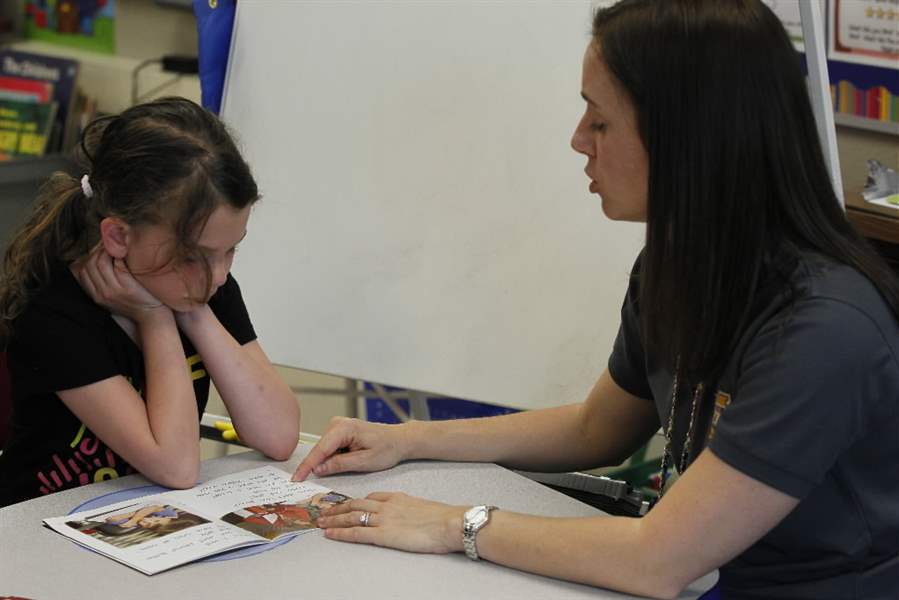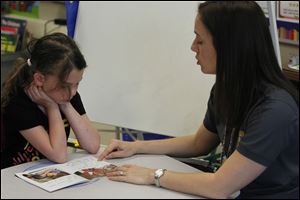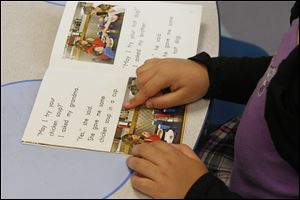
Summer reading strengthens students’ skills
5/16/2014
Reading teacher Laura Keifer says, ‘It’s very important that children view reading in a positive light.’
THE BLADE/JETTA FRASER
Buy This Image

Reading teacher Laura Keifer says, ‘It’s very important that children view reading in a positive light.’
One Maumee reading teacher’s easy-to-implement ideas to keep children reading through the summer are bound to remove the feeling that it’s a job for parents to get their kids to read and a chore for youngsters to do so.
First of all, it’s important to be up front with students about the value of reading, said Laura Keifer, reading specialist at Fairfield Elementary School.
“I’m straightforward with the kids I work with,” Mrs. Keifer said. She tells them that “If you don’t read over the summer, you won’t be as strong a reader. There is nothing wrong with telling them it will help them be better readers.”
To accomplish that goal, summer reading is necessary, she said, and what Mrs. Keifer herself has learned is to urge children to read for about 10 minutes daily for each grade level. For example, she said it’s way better for pupils leaving the third grade to read 30 minutes a day than to push them to try to read for an hour each week.
Mrs. Keifer must know what she’s talking about. She has a website called Mrs. Keifer’s Reading Resource, and it’s easy to navigate. That web address is keiferreading.weebly.com.
She wants parents to remember that children don’t always have to be reading formal books.
“Encourage them to read signs, or menus, or different things they see,” she said. “It’s important to make it fun, too. The more access they have to books, the better.”
That means not merely placing books on the home’s bookshelf. Put them throughout the house, such as in the kitchen, bathroom, as well as in bed, living, and family rooms, she said. And there are better ways to foster a love of reading in a child than to have him or her sit in a chair at her desk to read or to stay in his room to read.
“It’s very important that children view reading in a positive light,” Mrs. Keifer said. “Going to the library to pick out new books, reading in different locations — under a tree, at the park, in a tree house — and bonding over books with family members and friends are all great ways to do that.”

A student in the reading program practices her skills.
Although many children want to read what’s cool or trendy or what older kids are reading, she added. That’s were taking advantage of the expertise of public librarians is helpful. Mrs. Keifer said they are really good at helping students find books that are at their grade level. Nevertheless, she said not to discourage them from trying to read material beyond their grade level. After all, there’s value in exposing them to reading upper level material, and “then talking about it,” she said.
“Try to build reading into their daily routine,” she added.
A part of that summertime routine includes going to the neighborhood Toledo-Lucas County Public Library to take advantage of the summer reading programs. Mrs. Keifer urges parents to let their children visit sections other than just the children’s section at our public libraries.
And while many families travel during the summer months, those whose family budget don’t allow it can still take advantage of venues around town, such as the parks, museums, and various summertime activities such as ethnic festivals in the area.
“Trips and experiences will help them be a better reader [because] they are learning about the world,” Mrs. Keifer said.
When children come across material they are not familiar with, it’s an opportunity for them to learn.
“The other day I was reading a book about the Statue of Liberty and some kids didn’t know what that was,” she said. It provided her a chance to help them learn about the American icon.
And as you might imagine, reading and writing come as a couple. And for children who struggle with reading who also struggle with writing, Mrs. Keifer suggests having them keep journals during the summer months, or to have a pen pal. If that’s too outdated for today’s youngsters, urge them to write a different ending to a book they have read, or to write what was enjoyable about a book.
“It’s OK to explain to children the educational benefits of reading over the summer, that it will help them keep their reading skills sharp and [help them] be better prepared for school in the fall,” she said.
“The main focus should be on fostering a natural love of reading, enjoying books together as a family, and integrating reading into children’s daily lives.”
Contact Rose Russell at: rrussell@theblade.com or 419-724-6178.